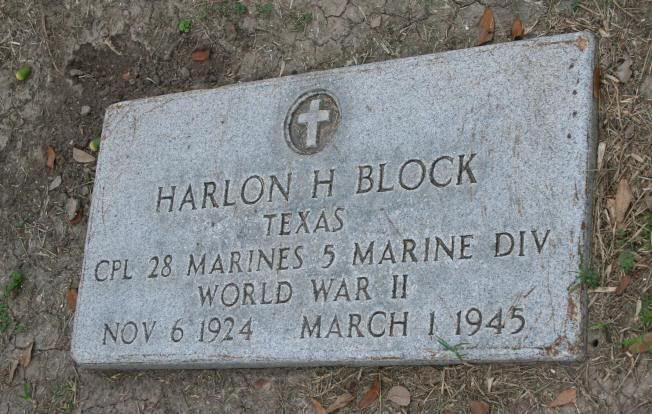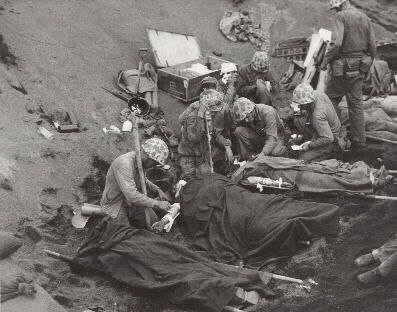
Memorial Day, 2010. Most of the country will enjoy a day off work, a family get-together, a picnic. Some will remember what the day is about. That doesn't include our president, but he has more important things on his mind than attending the ceremony at Arlington National Cemetery. He's in Chicago, getting together with the boys in the 'hood. What did you expect? He's not one of us. He Is the World, although the world's people who should fear us are laughing at us, and him.
Most of those who remember those we honor on Memorial Day will be thinking of Iraq and Afghanistan, as they should. But history looms above and behind us as well.
For instance, February and March 1945.
Iwo, by Richard Wheeler, was published in 1980. It describes the assault on Iwo Jima, the next-to-last in the series of Japanese-held islands that American strategists determined were necessary to take in the prelude to the expected invasion of Japan. Wheeler himself was with the Fifth Marine Division on Iwo -- a member, in fact, of Easy Company, some of whose soldiers were caught in AP photographer Joe Rosenthal's famous shot of the flag raising on Mount Suribachi.
As World War II fades into cozy nostalgia, we need from time to time to recall the grim reality. It took a month to capture Iwo. During that time, the island was unsecured, the Marines advancing with heavy losses, a few yards at a time.
Here are a few examples from many of what "unsecured" meant to the Marines whose job was to destroy the enemy, quoted from Wheeler:
Even as the Marines advanced to the north, they faced two miles stocked with the main forces of the Japanese commander, General Kuribayashi.
Most of those who remember those we honor on Memorial Day will be thinking of Iraq and Afghanistan, as they should. But history looms above and behind us as well.
For instance, February and March 1945.
Iwo, by Richard Wheeler, was published in 1980. It describes the assault on Iwo Jima, the next-to-last in the series of Japanese-held islands that American strategists determined were necessary to take in the prelude to the expected invasion of Japan. Wheeler himself was with the Fifth Marine Division on Iwo -- a member, in fact, of Easy Company, some of whose soldiers were caught in AP photographer Joe Rosenthal's famous shot of the flag raising on Mount Suribachi.
As World War II fades into cozy nostalgia, we need from time to time to recall the grim reality. It took a month to capture Iwo. During that time, the island was unsecured, the Marines advancing with heavy losses, a few yards at a time.
Here are a few examples from many of what "unsecured" meant to the Marines whose job was to destroy the enemy, quoted from Wheeler:
Resistance to the landing activities had grown since [Easy Company] had come ashore. The beach was receiving steady artillery and mortar fire, and a chain of destruction was being forged at the water's edge. Useless landing vessels, trucks, jeeps, and other pieces of equipment were settling haphazardly into the surf-soaked sand. The scene included lifeless bodies, many badly torn, reddening the water than lapped about them.
A man on the beach in the 4th Division zone who watched one of the tanks start inland later related: "It was trying to edge over the first terrace when it was hit by a mortar that blew off its right tread. Marines began trying to get out of the turret. Another mortar lit right on the turret. The tank spread apart a little. All the Marines were killed."
Says [Gunnery Sergeant Hap] Mowrey: " ... We approached a bunker. Almost in a detached way I saw a yellow arm flick out and vanish. In an instant I felt the impact of the grenade. I was thrown off my feet, my helmet spun away, and my rifle and bayonet flew out of my hands. I got the feeling I had been cut in two. ... I had multiple wounds, chest and abdomen. I believe the chest cavity was rapidly filling with blood, because breathing became extremely difficult and I could no longer walk. Four men from the company volunteered to take me to an aid station. There were no stretchers, so a poncho was used."
Even as the Marines advanced to the north, they faced two miles stocked with the main forces of the Japanese commander, General Kuribayashi.
The terrain itself, described by an American newsman as looking "like hell with the fire out," was made up of barren plateaus, craggy hills, cliffs, twisting ravines and gullies, crumbling boulders, and struggling brushwood. The defenses numbered in the thousands, many of them mutually supporting. There were blockhouses, bunkers, pillboxes, caves, tunnels, trenches, mortar pits, rocket pits, machine gun nests, spider traps, dual-purpose antiaircraft positions, stationary tanks, antitank ditches, minefields, and booby traps.The Marines didn't want to die for us. They wanted to uphold the esprit de corps, win the war and go home. But we owe the kind of Memorial Day that we can enjoy this year in part to them and many like them. Lest we forget.
It was all a deeply sobering business: trying to advance against an ingeniously concealed enemy, receiving fire not only from the front but from bypassed defenses on the flanks and even in the rear, suffering casualties and more casualties. If you remained unhurt you nevertheless knew you might take a savage blow at any second. You hoped fervently the wound would not be fatal. Huddling in a hole during a barrage, you tried to protect those parts you worried about most, holding an elbow across your face or positioning a rifle stock as a shield for your genitals. You began to realize that you would be willing to give up an arm or a leg for the privilege of staying alive.
Throughout the ordeal, you were obliged to watch the mutilation and destruction of others, often at a range so close that you were splashed with blood. While attacking at your side, your best friend might be disemboweled by a shell fragment, clutching at the cascading viscera and looking up at you with a plea for aid you could not give, his eyes soon glazing over and closing forever.






1 comment:
Linked: Memorial Day 2010
Post a Comment